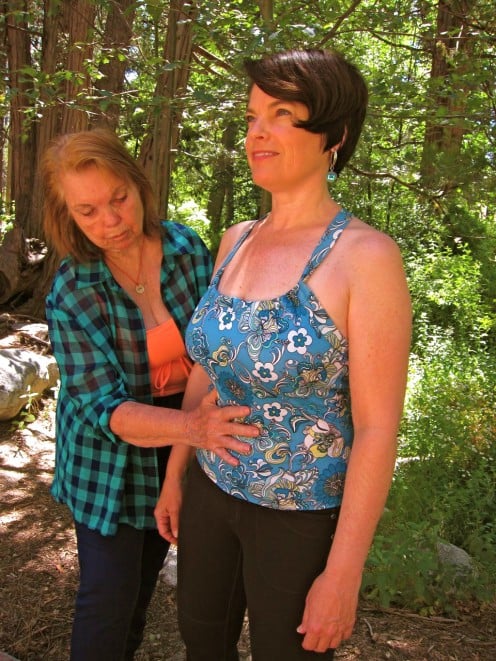How - to - Sing - Better - With - These - 3 - Singing - Voice - Tips
Audrey Hunt's Student On "American Idol."

The singer has everything within him. The notes come out from his very life. They are not materials gathered from outside. ~Rabindranath Tagore
The Three D's to Better Singing
Would you like a better singing voice? I'm sure you would and as you follow the three tips I'm sharing with you, you will! The secret to change, any kind of change, is to apply these three words:
Desire
Discipline
Determination
As you follow the tips I have laid out for you, your voice will begin to sparkle and shine as never before. Will you sound better? Absolutely!
Audrey Hunt Performing for Earth Day Celebration

Breathing For Singing Is Different Than For Speaking

Singing Tip #1 - Breath Control. The Powerhouse For Singing
Your breath is the life-force for your singing. It is everything! I'm not talking about your regular way of breathing. The way you breathe, when you speak, will not give you the sound you want for a better voice. Never! Why? Because you were born with a large breathing muscle, just below your rib cage, that provides you with perfect support for singing. You may have heard the term "diaphragmatic breathing" which is a muscle shaped like a parachute that acts as a cushion for the tone to ride on.
Take a look at the benefits of breathing diaphragmatically (belly breathing):
- Weak tones become stable and controlled.
- Your vocal range becomes bigger (extended.)
- You'll develop a rich, beautiful tone.
- The sound of your voice projects like never before.
- Natural, easy, vibrato comes naturally.
- You'll hold a note (sustain) forever and a day.
- Fear is reduced and confidence gained.
- No more running out of breath before you're ready.
Great Singing Requires Dedication and Discipline

"We are what we repeatedly do. Excellence, then, is not an act, but a habit."
Aristotle
Singing Tip #2 - Discover Your Resonating System
Your resonators are your mouth, nasal passages, chest, and head areas and they amplify your sound. That's right! If you're in the dark about these tremendous vocal enhancers, it's time to start producing your sound with their help. The result of resonation is to make a "better" sound.
All acoustic instruments such as the guitar, trumpet, piano, or violin, has its own special chambers for resonating the tone. Once the tone is produced by the vibrating vocal cords, it vibrates in and through the open resonating ducts and chambers. Since the vocal tract is often associated with different regions of the body, different resonance chambers might be referred to as chest, mouth, nose/"mask", or head.In general, the larger a resonator is, the lower the frequency it will respond to; the greater the volume of air, the lower its pitch. But the pitch also will be affected by the shape of resonator and by the size of opening and amount of lip or neck the resonator has.
Here's a brief introduction into your main resonating chambers:
- The Chest Voice. This resonating area is usually an easy part of the voice to sing in, although for women it can sometimes be more difficult. The chest voice is easily found by simply sustaining your natural speaking voice, providing you speak with a decent sound. Use a deep "whoa" as though you were demanding a horse to stop. Feel the vibrations emerging from the chest.
-
Middle Voice. The middle voice is the most sought after vocal register. Why? It's the bridge between your chest and head voice. It takes your voice from low to high, bridging the gap in between. The trick for the singer is to bridge that gap without allowing the voice to "break" or "crack."
·The Head Voice, or "head register" is used when singing in the higher part of the range. When singing in the head voice, the vocal folds are thin; the head voice is usually associated with light, bright sounds. Singers often feel the vibrations from singing in the head voice in their head or in the back of the neck. - The Mouth. Another area where vibrations are found is in your mouth, such as the roof of the mouth (hard palate), or even the front of the face. Just be aware of these vibrations as you sing.
Singing Tip #3 Choose Your Song Written in Your Key
If the song you choose is too high or too low and you end up straining your voice to reach the notes then your material is in the wrong key. It's not for you my friend.
The point is - the easier the song is to sing, the better you are going to sound. This is especially true when you're in the beginning stages of developing your voice.
When choosing the right song to sing remember these rules:
- Can you sing the highest notes without pinching the sound or cracking your voice, and thus making it clear to an audience that you are struggling to hit those notes?
- Does the tone of your voice fall apart, change dramatically, become breathy or sink back into the throat when you attempt to sing the low notes? If so, you need to work on the bottom end of your range.
- Do you struggle to stay on pitch? If so, you may not yet be ready to sing this particular song at this time.
- Are you running out of breath or becoming lightheaded during a performance? You may need to return to the basics of proper breathing techniques. Closely examine where and how often you are taking breaths during a particular song. Breathe in through the nose and breathe out through the mouth.
- Find a song that highlights your own strengths and not someone else's. Simple songs allow you the freedom to do this.
- Original songs, whether written by yourself or by someone who is writing specifically for your voice, allow you to be as creative as you like and to define the personality and sound of the song. These types of songs allow you the freedom to express yourself through your own lyrical poetry and vocal interpretations and allow you to have more control over a song's range and key.
Determination is the key to developing the kind of voice you would like to have. How much do you really want to sing and sound just great? The basic keys to a great voice are:
- Total control over your voice. Practice proper breathing techniques Nothing else works right until you learn this basic principle. Be determined to spend the time needed to develop this magnificent tool.
- Singing on key. There is no excuse for singing flat or sharp. If you have trouble with pitch or don't know if you are singing on key, get help by hiring a teacher or coach.
- Proper Diction - If you have not learned how to shape the vowels that make up the words you sing, learn how now. Sloppy pronunciation of lyrics cause your voice to lose tonal energy as well as muffle the sound.
- Open Throat. If the soft palate is not activated (lifted) during phonation your sound is trapped. It cannot "travel" and project. This is an important technique to learn.
- Vibrato. Some styles of music call for a nice, controlled vibrato. Keep the neck and shoulders relaxed when using vibrato. Control the speed of oscillations.
- Posture. Your body is your instrument, therefore you must use correct posture each time you sing. Your singing muscles must be supported properly.
- Vocal registration (resonating areas). Learning how to place your singing in the right resonating chamber adds richness and quality to your voice.
Determination builds character. The first step is to set goals. Keep these goals simple to help you in following through and establishing small increments of success.
The 7 basic keys to a great voice as listed above can only be achieved one step at a time. As you master one singing technique and skill only then are you ready to tackle the next one. The order at which you practice these techniques will depend on your present voice. A qualified instructor will know which technique needs to be addressed after hearing you sing.
Stay Determined and Never Give Up
Determination builds character. The first step is to set goals. Keep these goals simple to help you in following through and establishing small increments of success.
The basic keys to a great voice as listed above can only be achieved one step at a time. As you master one singing technique and skill only then are you ready to tackle the next one. The order at which you practice these techniques will depend on your present voice. A qualified instructor will know which technique needs to be addressed after hearing you sing.
Surround yourself with supportive people.and avoid those who are negative and critical.
Audrey Hunt
Conclusion
Whether you plan to be a professional singer or just sing for the love of it the discipline required for learning how to sing also relates to other areas of life. Those who study a musical instrument tend to be disciplined throughout life.
We all want a richer singing and speaking voice. In a sense, our voice defines who we are. We recognize this truth when we feel angry. Our voice is elevated, harsh and out of control. And so are we.
The Three Singing Tips you've just read about develop the necessary tools for a more successful and rewarding voice.
One thing is for sure,singing is a wonderful way to express yourself. Vocal lessons help to improve a person's self-esteem because they are working to better themselves. Sing because you're happy and sing when you're sad. Sing about the good times and sing about the bad.
Singing is your birthright. Avoid being over critical and hard on yourself. Free the voice that lies within . . . let it fly
Have You Ever Studied Singing?
What a Wonderful World Scenic
Some days there won't be a song in your heart. Sing anyway. ~Emory Austin
© 2011 Audrey Hunt






